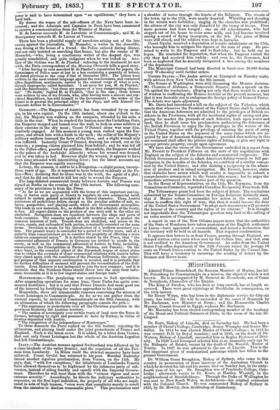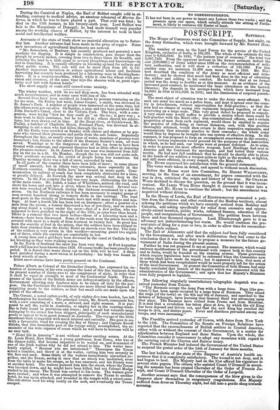Zistt llautuitg.
Admiral Prince Menschilcoff the Russian Minister of Marine, has let; St. Petersburg for Constantinople on a mission, the object of which is not known. He is accompanied by M. Demetri de Nesselrode, son of Count de Nesselrode, Chancellor of the Empire. The King of Sweden, who has been so long unwell, has at length re- covered. There were great rejoicings at Stockholm in consequence, on the llth instant.
Sir Henry Wynn, who has been in the diplomatic service for fifty-six years, has retired. He will be succeeded at the court of Denmark by Mr. Buchanan, now Minister at Borne; and the Honourable Charles Murray, Consul-General in Egypt, replaces Mr. Buchanan. Mr. Macaulay has been elected corresponding member of the Academy of the Moral and Political Sciences at Paris, in the room of the late Dr. Lingard.
Dr. Kaye, Bishop of Lincoln, died on Saturday last. He had been a member of Christ's College, Cambridge, Senior Wrangler and Senior Me- dallist. In 1814 he was elected Master of Christ's College ; in 1815 he was created D.D. by Royal mandate; and in 1816, on the death of Dr. Watson, Bishop of Llandaff, succeeded him as Regius Professor of Divi- nity. In 1820 Lord Liverpool selected him at an unusually early age for the Bishopric of Bristol, vacant by the death of Dr. Mansell, Master of Trinity. In 1827 he was advanced to the see of Lincoln. This is the first important piece of ecclesiastical patronage which has fallen to the present Government
Dr. William Grant Broughton, Bishop of Sydney, who came to this country in prosecution of those interests of the Australian Church to which he devoted his life and his means, died on Sunday last, in the sixty- fourth year of his age. Dr. Broughton was of Pembroke College, Cam- bridge ; afterwards curate to Dr. Keate, at Hartley Westfall, in the neighbourhood of Strathfieldsaye. Through the Duke of Wellington he was sent to New South Wales, as Archdeacon—his- original connexion with the Colonial Church. Ho was consecrated Bishop of Sydney in 1836, by Dr. Howley, then Archbishop of Canterbury,
During the Carnival at Naples, the Earl of Belfast caught cold in at- tending, contrary to medical advice, an amateur rehearsal of Marion 1)e- brats, in which he was to have played a part. That cold was fatal; he died on the Ilth instant, in his twenty-sixth year. Lord Belfast was heir to the Marquisate of Donegal ; he had made himself very popular among the working classes of Belfast, by the interest he took in their social and intellectual welfare.
Accounts of the state of trade show no material alteration up to Satur- day last. Another advance had been made in the price of copper. Some new inventions of agricultural implements are noticed.
"Mr. Samuelson, of Banbury, has recently produced and patented a new machine for digging. It is simple in construction, goes deeper than the plough by several inches, covering from two to three times its breadth, and reducing the land to a tilth equal to several ploughings and harrowings—in fact to trenching. Ills equally effective in breaking up land for railway and other public works. The cost will not be more than from 10/. to 151. Another important invention to reduce agricultural labour and facilitate harvesting has recently been produced by a labouring man in Buckingham- shire. It is a reaping-machine, which, while it cuts the wheat with pre- cision and closeness, at the same time lays the sheaves with as, great regu- larity as if laid with human hands."
The short supply of coals still caused some anxiety.
The wintry weather, with its ice and deep snow, has been attended with much inconvenience, and in some eases with loss of life.
Several lives have been sacrificed in London by persons venturing on the ice too soon. On Friday last week, James Cooper, a smith, was drowned in St. James's Park. A number of people were immersed at the same time, but the others were got out alive. On Sunday, a man and two boys perished in Sir John Duckett's Canal, close to the Victoria Park. The boys, with a com- panion, were trying "how far they could go" on the ice; it gave way ; a i man went to the assistance, but he too fell in ; others shared his misfor- tune, but were drawn out in time. At the Brent river, at Cricklewood, Mr. Padley, a butcher of Charlotte Street, Portland Place, was drowned in at- tempting to aid a man who had fallen through the ice. All the Parks were crowded on Sunday with sliders and skaters or by per- sons who viewed their pleasures and perils from the safe banks. Repeatedly throughout the day, on nearly every piece of water, numbers of persons were immersed ; but, thanks to the efforts of the Humane Society's men, all were saved. Warnings as to the dangerous state of the ice seem to have been treated with contempt, and repeated disasters had as little effect in deterring the pleasure-seekers. In St. James's Park one man was immersed from fall- ing on the ice in a fit. On Monday, though the ice was still not quite safe, fewer accidents occurred, the crowd of people being less numerous. On Tuesday morning there was a fall of snow, succeeded by rain.
In all parts of the country there have been falls of snow; in some places of small amount, but in others very extensive, more especially in the Northern counties. Deep drifts have been formed in many parts. Com- munication by railway or coach has been completely obstructed for a time, or greatly delayed. At Norwich the snow was several feet deep in the streets. In the Fen country the fall was very large, obliterating the tracks of the main roads. Mr. Lamb, a baker of Whittlesea, mistook the road, and drove his horse and cart into a river, where he was drowned. Several ves- sels were wrecked off Wisbeach during the darkness accasioned by a snow- storm. On the Northern railways it has been necessary to employ gangs of men several hundred strong to remove drifts in the cuttings. The road snail-posts in the vicinity of Newcastle have met with many delays and mis- haps. At least a fourth life has been lost on Dartmoor : about a quarter of a mik from the prison, a farmer discovered a box of jewellery, and on search- ing about found a corpse under the snow—that of a Jew pedlar, who was supposed to have perished on the night of the 12th, as cries were then heard. There is a rumour that two more bodies—those of a labouring man and a woman—have been discovered. Some of the roads near the prison have been covered with snow to a depth of from fourteen to twenty feet. So great has been the scarcity of food in the prison, that the soldiers have been obliged to bake flour obtained from the Duchy Hotel on shovels over the fire. The duty of the soldiers is very severe in this weather—mounting guard two nights out of three, while the convicts are comfortably in bed. A young man and a girl have been drowned in the canal at Carlisle by the ice breaking as they were walking across. In the North of Scotland the snow has been very deep. At Fort Augustus such a fall has not been known since 1826. Of course traffic has been greatly im- peded. It is feared that many sheep out on the hills will be lost. A shep- herd perished during a snow-storm at Letterfinlay : his body was found in a deep wreath of snow. Great snow-storms have been pretty general on the Continent.
Prince Albert, as Colonel of the Grenadier Guards, has expressed his in- tention of increasing at his own expense the band of this fine regiment from its present number of thirty-two to the complement of sixty, in order that it shall be equal in strength to most of the Continental bands. The ex- penses of the bands of the British Army are defrayed entirely by the officers, Government allowing only fourteen men to be taken off duty for the pur- pose. On the Continent the Governments are more liberal than England in supplying music to the soldiers, so that but small calls are made upon the purses of the officers.
The Corsair, a noted cutter-yacht, of only eighty-five tons burden, has left Southampton for Australia. The principal owner, Mr. Kreeft, commands her, with a crew consisting of a mate, a steward, and eight seamen. It is pur-
posed to sell the yacht in Australia, or employ her in the coasting-trade. She is fully found in provisions and stores ; and a small but valuable cargo
belonging to the owner has been shipped, principally of such manufactured
goods as appear to be in great demand in Australia. The voyage of the little merchant-bark is regarded with much interest and curiosity. She goes to sea with a favourable wind for crossing the Bay of Biscay ; and Captain Kreeft thinks, that this formidable part of the voyage safely- accomplished, the re- mainder of the wide expanse of ocean which he will have to traverse will be an easy task.
"Hotel life in America" is not without rather exciting scenes. At the St. Louis Hotel, New Orleans, a young gentleman from Texas, who was at the dinner-table, I/ad become impatient to be waited on, and demanded of one of the Irish waiters why he did not attend to him. The waiter inso- lently replied, "Because you are intoxicated." Thereupon the Texan seized a tumbler, and threw it at the waiter, cutting him very severely in the face and neck. Some thirty of the waiters immediately assembled tto- gether, and the Texan, seeing at once that an attack was meditated, arose from the table to make his escape, as he was unarmed, and his friends were at another hotel. The waiters pursued him into the street, where the Texan was knocked down, and he might have been killed, had not Colonel Mudge rushed to his rescue. The Texan was carried to his room. The waiters grew more excited ; and when it was attempted to remove the Texan to another hotel, he was again attacked, and wounded in the temple with a sword-cane. The cab-driver used his whip lustily on the mob, and eventually the Texan escaped.



























 Previous page
Previous page